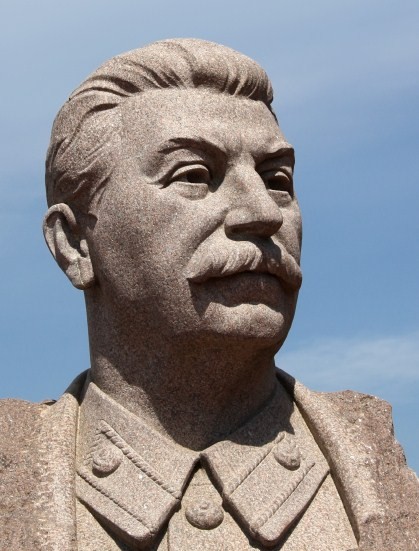
Joseph Stalin – the quiet tyrant.
I’ve just finished a long essay – more than 5,000 words – on Joseph Stalin for the Key Leaders section of the site. And writing it made me think once again of the people I’ve met who directly encountered Stalin, and of how their recollections were never quite what I expected.
I suppose, given that Stalin was responsible for the death of millions and had triumphed in the brutal stab-in-the-back (and stab-in-the-front) world of Soviet politics, I had imagined he would be an obviously terrifying figure to meet. But, though he undoubtably did often strike terror into the hearts of people called into his presence, he didn’t use obvious methods to dominate people. Unlike Hitler or Mussolini, Stalin was not bombastic. Stalin rarely launched into lengthy monologues and he seldom screamed at people. Instead, he looked at them.
‘Stalin watched people’s eyes when he was speaking,’ says Stepan Mikoyan, who met Stalin a number of times. ‘And if you didn’t look him straight in the eye, he might well suspect that you were deceiving him. And he’d be capable of taking the most unpleasant steps… He was very suspicious. That was his main character trait… He was a very unprincipled man… He could betray and deceive if he thought it was necessary. And that’s why he expected the same behaviour from others… anyone could turn out to be a traitor.’
Other people I interviewed who encountered Stalin confirmed the same thing – Stalin seldom spoke in meetings, but watched carefully as you talked to him. He was – and this must be rare in tyrants – a great listener. He would then pick up on any inconsistencies or loose remarks you made and question you – or make fun of you. He was brilliant at ‘cutting to the chase’ as my American co-producers were so fond of saying, and an expert at puncturing pomposity. When, for example, Ribbentrop grandly proposed a non-aggression pact between Germany and the Soviet Union that would last ‘one hundred years’, Stalin replied that if they agreed a hundred year pact then ‘people will laugh at us for not being serious’ and then suggested a ten year pact.
Stalin also had a sharp and cynical sense of humour. When Churchill remarked that ‘Where there were two Poles there was one quarrel’, Stalin replied that ‘where there was one Pole he would begin to quarrel with himself through sheer boredom’.
More than anything, Stalin was a brilliant negotiator. His lack of personal vanity meant that he could let Churchill and Roosevelt drone on whilst he plotted his next move. As one of the British delegation spotted, whenever Stalin spoke it was ‘very much to the point’.
But, perhaps paradoxically, learning of what it was like to meet Stalin and then studying the way he conducted negotiations with the Germans and then the Allies, made me find him all the more frightening. Because at no point in my studies did I find any evidence that Stalin possessed the slightest humanity or compassion. Individuals meant nothing to him. This deeply suspicious and paranoid man would do whatever was necessary for his own survival – murder men, women or children. Condemn whole nations of innocent people. Whatever was necessary. And he would do all this without a moment’s upset – and without ever having to raise his voice or lose his cool.
So, I sometimes think, just be glad that the lottery of your own birth didn’t place you in Stalin’s circle. For as Nikita Khrushchev said: ‘All of us around Stalin were temporary people. As long as he trusted us to a certain degree, we were allowed to go on living and working. But the moment he stopped trusting you, the cup of his distrust over flowed.’
 Twitter
Twitter






Stalin washable to speak very much to the point because there was only one thing that interested him – himself. This is why he was capable of such unspeakable cruelty because nobody mattered at all to him except himself. The rule of fear is never so effective as when the perpetrator needs no one but himself because that puts eve a so- called right hand man at risk. What a despicable and revolting tyrant and yet people followed him. Why?